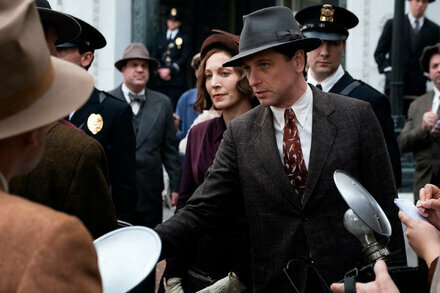Perry Mason rests



Perry Mason wrapped up its first season last night, and the end result is as conflicted as Perry has been throughout these eight episodes. There is no eleventh hour miracle, no witness breaking down on the stand (“No one confesses on the stand,” Hamilton Burger intones with an implied eyeroll as Perry practices for court), and no rabbit for Perry to pull out of his hat. The resolution of Charlie Dodson’s murder case is, perhaps, practical but it isn’t terribly satisfying for Perry, District Attorney Barnes, or Emily Dodson, who is completely broken by the end of the proceedings.
It’s also not terribly satisfying for us, the audience, because the Charlie Dodson case was overcomplicated in order to justify Perry and his associates running around for eight episodes, when we knew all along who killed Charlie Dodson. There was never much dramatic tension, and in the end, Perry Mason doesn’t overcome that deficit. The classic Perry Mason’s courtroom scenes are unrealistic, but they are theatrical, full of tension and drama. Without that to scaffold the new Perry Mason, we’re left with a glossy period drama loaded with top-notch performances but not much else, drama-wise.
Season two doesn’t hold much interest beyond watching Matthew Rhys ply his trade alongside a coterie of talented actors (bring on Justin Kirk as Perry’s arch-nemesis, DA Hamilton Burger). The performances of Perry Mason are fantastic—Rhys is a pure joy to watch—but if you ask me what Perry Mason is ABOUT, I’m not sure. Something, something police corruption? It’s a fact the LAPD was wildly corrupt in the 1930s, but Perry Mason doesn’t really say anything about that beyond “corruption bad, racist cops bad”. Yeah, we know. Does that historical corruption and racism maybe have anything to do with those issues continuing today?
Something has happened in prestige dramas over the last few years: shows have stopped being ABOUT things. Spectacular performances and writing abound, but ask me what these shows are ABOUT, and I draw a blank. Plot has replaced story as the engine of good drama (plot = what is happening, story = why it is happening), and Perry Mason perfectly exemplifies the trend. There is a lot of plot, with byzantine schemes to extort money and crooked cops and roadside motels, but what is the story of Perry Mason? Ostensibly, it’s Perry’s origin as a defense attorney, but the show blazes through his indoctrination into the law, and there is no connection between the skills Perry displays as a lawyer and his background. We learn a lot about Perry but very little of it actually serves a purpose. Cut the estranged wife and son, cut the World War I background, cut the entire plot with Lupe and nothing actually changes in the overall structure of the show, except we’d be down probably three entire episodes of plot.
I enjoy the hell out of Lupe, and the window dressing on Perry Mason is very, very pretty, but that’s all it is—dressing. Perry Mason tries so hard to overcome its roots as a procedural, but it ignores the best means to do so, which is to tell a banger of a story. Procedurals are all plot. Want to not be a procedural? Tell a story. The story of Perry Mason is just the plot of the Charlie Dodson case, with some colorful asides about various characters that do not meaningfully impact said plot. Della and Hamilton Burger both being gay? Interesting, but it has no bearing on anything. Perry losing the family farm? Sad, but you can ditch that entire subplot and not impact Perry’s trajectory at all. And the absolute worst culprit: Sister Alice, who has nothing to do with anything. Take her out of the plot and nothing changes except that, again, we have less episodes to watch because clutter has been removed.
A generous read is that Perry Mason is about corruption, maybe also loneliness and moving on. But what does it say about any of those things? What observations and connections does the show make? Perry only “moves on” because the plot demands he become a defense attorney, so he can’t mope on his farm forever. Characters are pushed forward not because they are making choices based on experience and circumstance, but because the plot demands it. A perfect example is Perry becoming a lawyer—it only happens because it needs to happen for the plot. Perry has expressed no interest in the law, and he does nothing to justify anyone’s belief in his ability to be a lawyer. The window dressing covers what it can (Perry dislikes a lazy defense attorney, he gives a moving closing argument), but really, why did Perry agree to become a lawyer? What drove him to make that decision, beyond “this show is about Perry Mason, the famous lawyer”?
It’s never a hardship to watch great acting, and there is plenty of great acting here, but Perry Mason squanders several ripe opportunities to be about something and ends up just ticking the usual procedural boxes. It did almost accomplish one outstanding feat, though, it almost overcomes the inherent tropes of a white dude riding to the rescue of a damsel in distress. It is crystal clear Perry would not have gotten even a split decision without the help of Detective Drake and Della Street, and Perry doesn’t exactly save Emily Dodson. She is excused from court on a mistrial, she is hardly exonerated. The season still ends with a new damsel in distress—or maybe a femme fatale—knocking on Perry’s door, but at least the show isn’t trying to pass him off as a unique genius who barks orders and gets results. We probably don’t need a second season of Perry Mason, though, unless it is going to be about something. Otherwise, it is just a very fancy, very expensive procedural.

